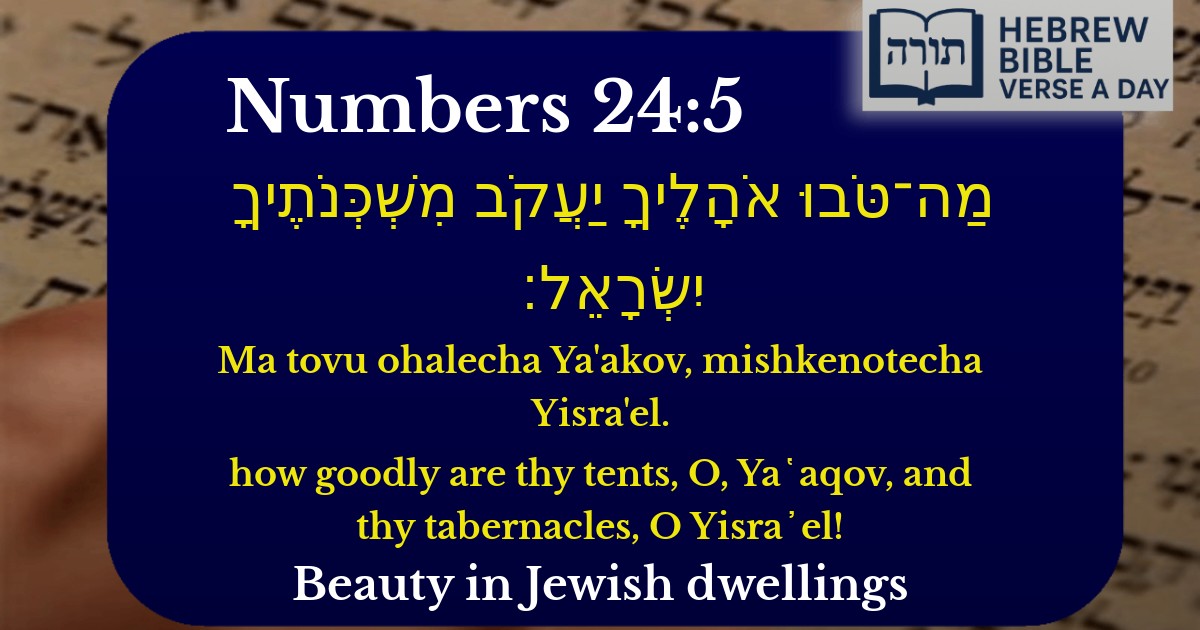Frequently Asked Questions
Q: What does 'How goodly are your tents, O Jacob' mean in Numbers 24:5?
A: This verse is part of Balaam's blessing over the Jewish people. Rashi explains that Balaam saw how the tents of the Israelites were arranged with modesty and privacy—no tent openings directly faced another—reflecting their moral integrity. The 'tents' symbolize the homes and way of life of the Jewish people, which Balaam recognized as virtuous.
Q: Why is this verse important in Judaism?
A: This verse highlights the sanctity of Jewish family life and community. The Talmud (Bava Batra 60a) derives from this verse the importance of modesty and proper conduct between neighbors. It teaches that the Jewish people's greatness lies not just in grand achievements, but in their everyday ethical behavior within their homes.
Q: How does this verse apply to Jewish life today?
A: The verse reminds us to create homes filled with holiness, kindness, and Torah values. Just as the Israelite tents were arranged with respect for privacy, we should build our families and communities with consideration for others. Many synagogues are designed based on this ideal, ensuring modesty and dignity in their structure.
Q: What is the significance of the two names Jacob and Israel in this verse?
A: Ramban explains that 'Jacob' refers to the physical tents where the people lived, while 'Israel' refers to the spiritual dwelling places—the study halls and places of worship. The verse thus praises both the material and spiritual aspects of Jewish life, showing they must both be conducted with holiness.
Q: Why did Balaam say this about the Jewish people?
A: Though Balaam intended to curse Israel, Hashem forced him to bless them instead (Numbers 23-24). The Midrash (Bamidbar Rabbah 20:1) teaches that Balaam saw the Shechinah (Divine Presence) resting on their tents and was compelled to acknowledge their spiritual greatness. This shows that even enemies recognized Israel's special relationship with Hashem.


Context of the Verse
The verse "מַה־טֹּבוּ אֹהָלֶיךָ יַעֲקֹב מִשְׁכְּנֹתֶיךָ יִשְׂרָאֵל" (Bamidbar 24:5) is part of the prophecy of Balaam, who was hired by Balak to curse the Jewish people but instead blessed them under divine inspiration. The verse praises the tents and dwelling places of Yaakov and Yisrael.
Rashi's Interpretation
Rashi explains that Balaam was struck by the orderly arrangement of the Israelite camp, where the tents were positioned in such a way that no one could see into another's dwelling, ensuring privacy and modesty (tzeniut). This reflects the moral and ethical standards of the Jewish people, which earned divine favor.
Midrashic Insights
Rambam's Perspective
In Hilchot De'ot, the Rambam emphasizes the importance of community structure and ethical living. The praise of the tents can be understood as an endorsement of a society built on Torah values, where homes are sanctified spaces for spiritual growth and kindness.
Symbolism of "Tents" and "Tabernacles"
The duality of "אֹהָלֶיךָ" (tents) and "מִשְׁכְּנֹתֶיךָ" (tabernacles) represents both the physical and spiritual dwellings of the Jewish people:
Practical Lessons
This verse teaches that the sanctity of Jewish life is reflected in: